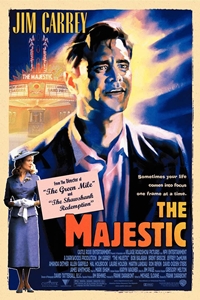The Majestic (PG) ★
 An aspiring screenwriter blacklisted in the 1950s gets a chance at a new life without knowing it after a car accident leaves him with amnesia.
An aspiring screenwriter blacklisted in the 1950s gets a chance at a new life without knowing it after a car accident leaves him with amnesia.
Story
Peter Appleton (Jim Carrey) has it made. His screenwriting career is on the rise, his first movie's just been made and he's got a cute girl. Life is good--until the House Un-American Activities Committee mistakenly fingers him as a Communist and he quickly falls from the A-list to the blacklist. Getting dumped by both his studio and his girl is nothing a little drinking can't remedy, but after drowning his sorrows he nearly drowns himself when he decides to drive drunk and his car veers into the river, knocking him unconscious. When Peter comes to, he can't remember who he is or where he came from, so he's taken in by the kindly people of Lawson, a burg stuck in time and still mourning the loss of many of its sons in World War II. They mistake him for Luke Trimble, one of their long-lost boys who went MIA in World War II, and are overjoyed at his return. Luke's father Harry (Martin Landau), whose zest for life had dwindled so much that he let his beloved movie house, The Majestic, fall to ruin, but with ''Luke's'' return, he plans to reopen it. Celebrations abound. Peter-as-Luke even returns to his relationship with fiancée Adele (Laurie Holden). Meanwhile, Peter may have forgotten who he was, but the Feds haven't, and they're on his tail.
Acting
When Carrey's given the right material, like he was with The Truman Show, he can exhibit moments of greatness. The Majestic doesn't give Carrey the leeway to show his quirky sensibilities, demanding that he play it straight throughout the movie (there are a few--too few--glances at humor that Carrey doesn't play up). To bring off the kind of schmaltz this movie oozes, Carrey had to bring something of an edge to his character. Instead Peter is neither likable nor unlikable, coming off as a bland, confused schmo until the climactic end, which after two hours of his weak personality, is wholly unbelievable. Landau is unexciting as a caricature of the sad, sentimental old man without hope--you want to sympathize but there's something faintly chilly about him. Holden's liberated-woman lawyer might have played better in a contemporary movie; she looks and acts too much like a modern-day actress trying to portray a woman of the '50s.
Direction
Was this some kind of vanity project dreamed up by a director too taken with his own greatness and past success? Was Frank Darabont envisioning an It's a Wonderful Life for the next generation? (Psst…it's likely the majority of the modern moviegoing public doesn't know who Frank Capra is and could care less, especially when the movie is as slow and as completely unbelievable as this one.) Apparently Darabont's in love with his own direction, because hardly a moment goes by without some lingering reaction shot. Darabont took an intriguing story about amnesia and mistaken identity and slathered it with sap. Old-fashioned period stories can be lots of fun, but it's imperative they be able to keep a present-day audience's interest by including a bit of modern wit and pace. Unfortunately this sticks to the straight-and-narrow. Nobody's going to buy the two-dimensional main characters, the shiny happy townspeople or, especially, the schlocky, my-country-'tis-of-thee finale. In its favor, The Majestic's ultimate message is a nice one. The movie does have its heartfelt moments and its '50s feel is authentic, if a little polished.
Bottom Line
Audiences a half-century ago might have had a hard time swallowing this kind of cornball mush--certainly modern-day audiences won't stomach it.
To get the full Quicklook Films experience, uncheck "Enable on this Site" from Adblock Plus
box office top 10

Civil War Released: April 12, 2024 Cast: Kirsten Dunst, Wagner Moura 11.1M

Abigail Released: April 19, 2024 Cast: Melissa Barrera, Dan Stevens 10.2M

Godzilla x Kong: The New Empire Released: March 29, 2024 Cast: Rebecca Hall, Brian Tyree Henry 9.5M

The Ministry of Ungentlemanly Warfare Released: April 19, 2024 Cast: Henry Cavill, Eiza Gonzalez 9M

Spy x Family Code: White Released: April 19, 2024 Cast: Takuya Eguchi, Saori Hayami 4.9M

Kung Fu Panda 4 Released: March 8, 2024 Cast: Jack Black, Viola Davis 4.6M

Ghostbusters: Frozen Empire Released: March 22, 2024 Cast: Paul Rudd, Carrie Coon 4.4M

Dune: Part Two Released: March 1, 2024 Cast: Timothée Chalamet, Rebecca Ferguson 2.9M

Monkey Man Released: April 5, 2024 Cast: Dev Patel, Sikandar Kher 2.2M

The First Omen Released: April 5, 2024 Cast: Nell Tiger Free, Bill Nighy 1.7M






